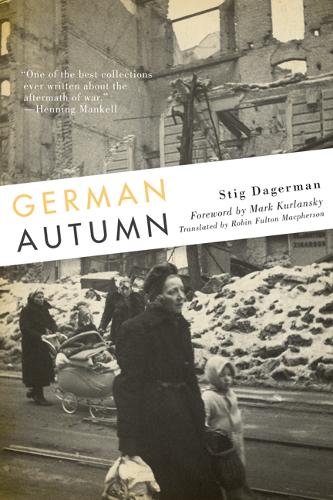
German Autumn
(Paperback)
Publishing Details
German Autumn
By (Author) Stig Dagerman
Foreword by Mark Kurlansky
Translated by Robin Fulton Macpherson
University of Minnesota Press
University of Minnesota Press
1st November 2011
United States
Classifications
General
Non Fiction
European history
839.787403
Physical Properties
Paperback
128
Width 140mm, Height 216mm, Spine 10mm
Description
In late 1946, Stig Dagerman was assigned by the Swedish newspaper Expressen to report on life in Germany immediately after the fall of the Third Reich. First published in Sweden in 1947, German Autumn, a collection of the articles written for that assignment, was unlike any other reporting at the time. While many held the belief that the German people deserved their fate, Dagerman disagreed and reported on the humanness of the men and women ruined by the wartheir guilt and suffering. Dagerman was already a prominent writer in Sweden, but the publication of German Autumn established him as a compassionate journalist and led to the longstanding international influence of the book.
Reviews
"Dagerman wrote with beautiful objectivity. Instead of emotive phrases, he uses a choice of facts, like bricks, to construct an emotion."Graham Greene
"German Autumn is one of the best collections ever written about the aftermath of war. It is on par with John Reeds classic articles from the Soviet Union as well as with Edgar Snows articles about the great political revolution in China. Stig Dagerman depicts the tragic realities of postWorld War II Germany with astonishing clarity and artistic skillfulness. He provides the reader with a profound insight, which ultimately is the story of every war. To anyone interested in understanding what great journalism means, German Autumn is indispensable. It should be compulsory reading for all young people who might consider becoming a journalist, and it is as alive as it was when first published in 1947. Read it."Henning Mankell
"German Autumn is a very important book and it is a very good thing that an English language version is becoming available for Americans. We need this book. "Mark Kurlansky, from the Foreword
Author Bio
Stig Dagerman (19231954) was regarded as the most talented young writer of the Swedish postwar generation. By age twenty-six he had published four novels, a collection of short stories, and four full-length plays, in addition to German Autumn.
Robin Fulton Macpherson is a Scottish poet and translator who has lived and worked in Norway since 1973.
Mark Kurlansky is a New York Times best-selling author of many books, including Cod: A Biography of the Fish That Changed the World and Salt: A World History.
